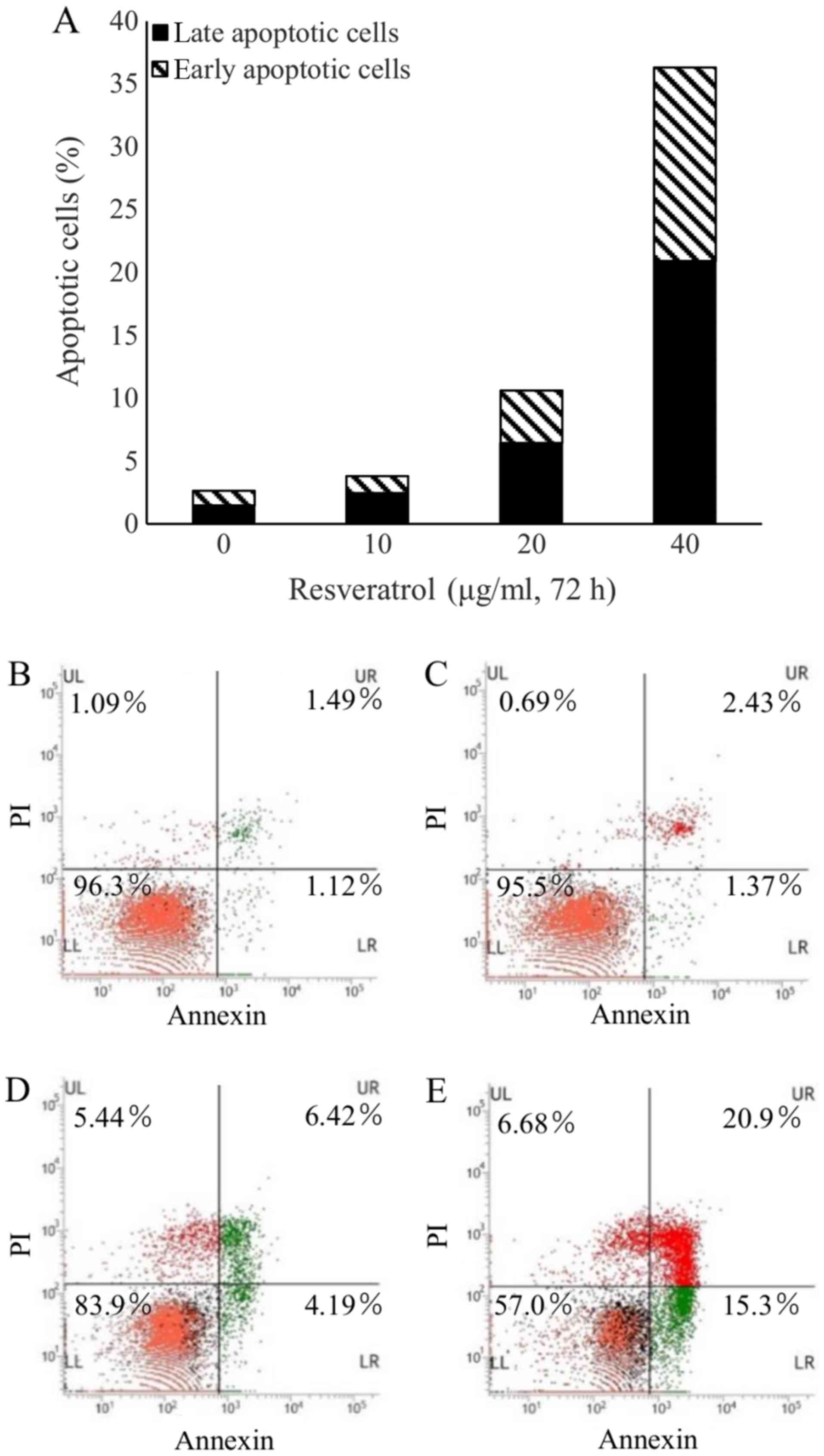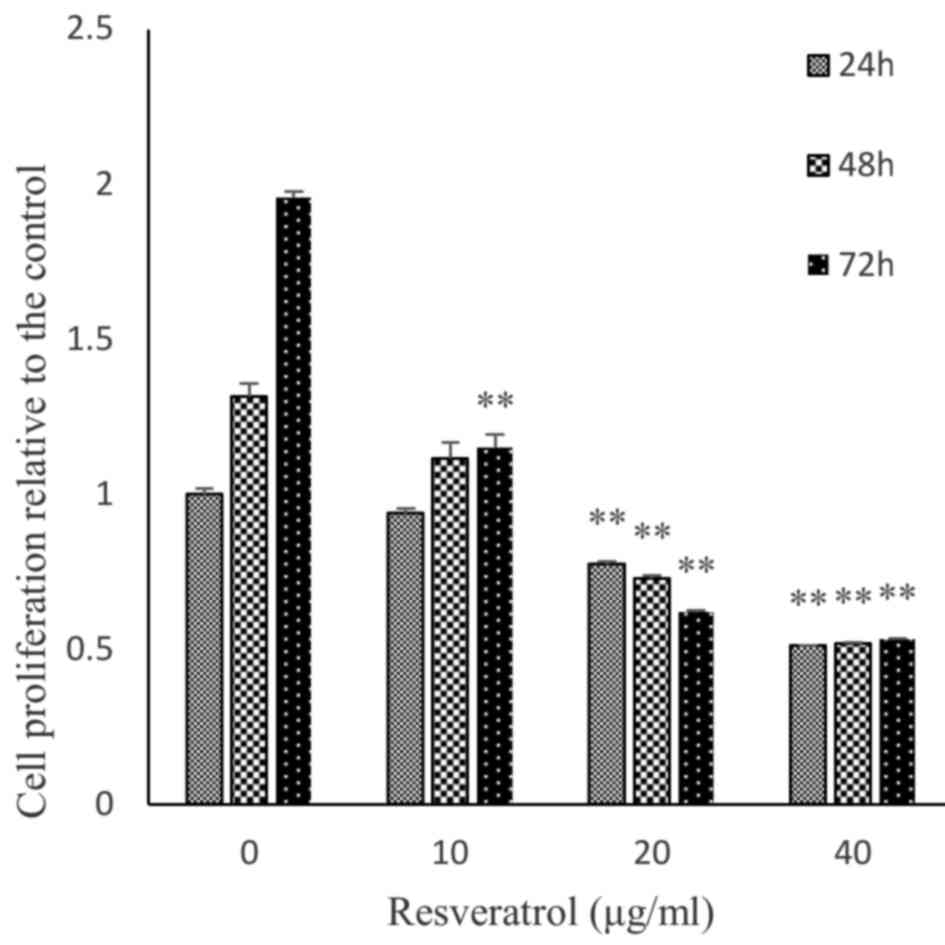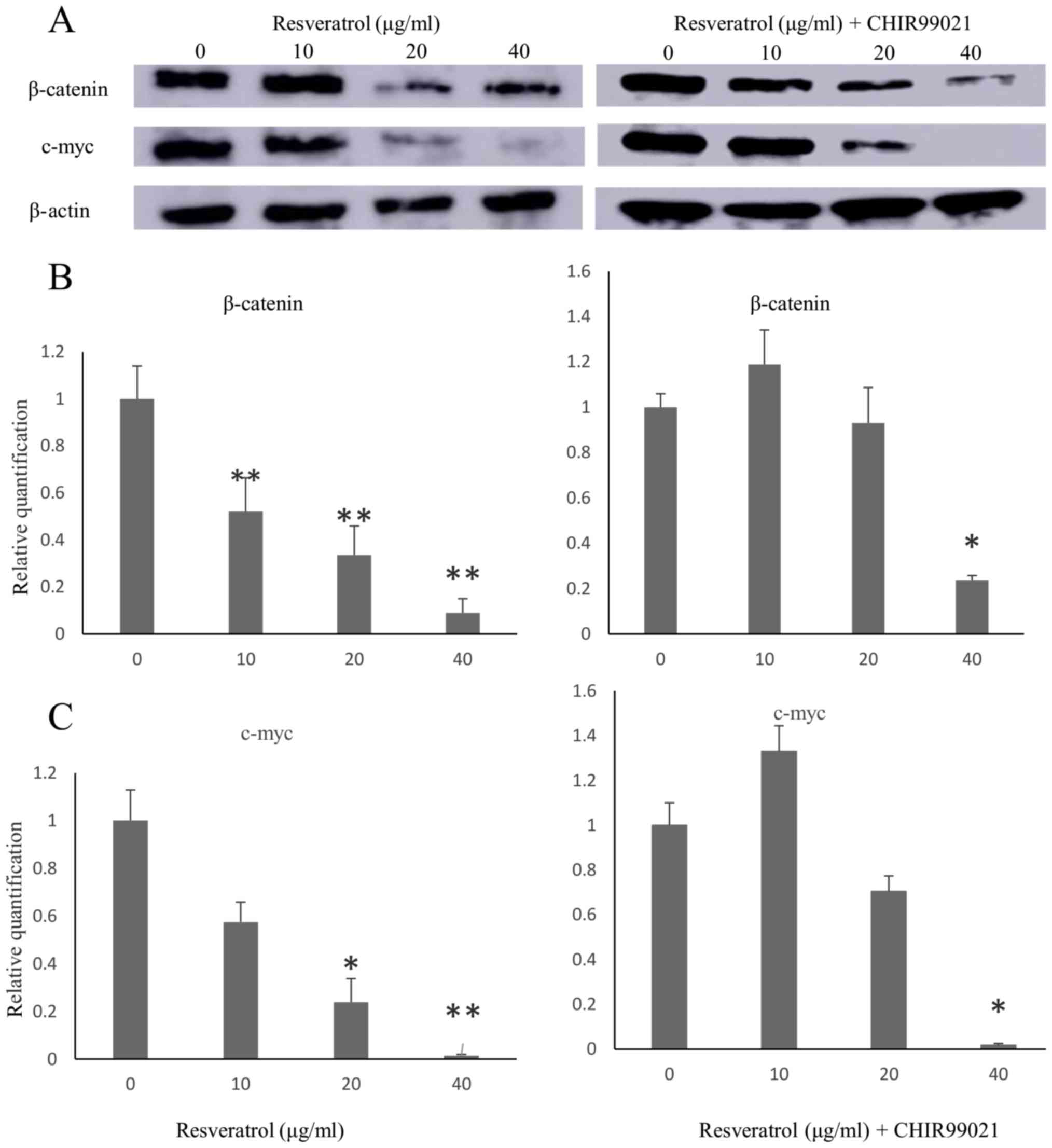Introduction
Among gynecological tumors, uterine sarcoma has one
of the poorest prognoses, and the most effective treatment is
complete resection. At present, no effective therapeutic drugs are
available for cases of recurrent and advanced-stage uterine
sarcoma. In recent years, pazopanib and trabectedin have been used
to treat soft tissue sarcoma containing uterine sarcoma; however,
their effects are limited. Thus, novel drugs are urgently required
for the treatment of uterine sarcoma.
Trans-3,4′,5-trihydroxystilbene (resveratrol) is a
natural polyphenolic phytoalexin present in grape skin. It has been
reported to function as an agonist of PPARγ (1). In 1997, Jang et al (2) reported on the anti-cancer effects of
resveratrol. Previous studies on resveratrol demonstrated that it
inhibits the proliferation and induces apoptosis in different
cancer cell types, including breast, prostate, stomach, colon,
pancreatic and thyroid cancers (3).
Resveratrol has potential as a novel drug with minimal side
effects. A previous study by our group reported that PGJ2, a PPARγ
ligand, inhibited cell proliferation in a uterine sarcoma cell line
(4). Resveratrol, which also acts as
a PPARγ agonist, has potential as an agent in the chemoprevention
of uterine sarcoma.
The canonical Wnt signaling pathway is important in
embryonic development. The activation of the Wnt signaling pathway
is involved in the onset of certain carcinomas, including colon
cancer (5). The Wnt protein induces
the accumulation of β-catenin in the cytoplasm, which then
translocates to the nucleus and causes the transcriptional
activation of the target genes c-myc and cyclin D (6). Previous studies reported that
resveratrol inhibited Wnt signaling via the β-catenin pathway in
osteosarcoma, gastric cancer and colon cancer (7–10).
However, the efficacy of resveratrol in human uterine sarcoma and
the underlying mechanisms of action have remained elusive. At
present, no drugs are available that target the Wnt signaling
pathway; however, since this pathway is associated with various
cancer types, it may be regarded as an attractive target for novel
treatments (11). Resveratrol has
potential as a novel therapeutic agent that targets the Wnt
signaling pathway.
In the present study, the effect of resveratrol to
inhibit the proliferation of uterine sarcoma cells and on the Wnt
signaling pathway were examined.
Materials and methods
Cell line and culture
The MES-SA human uterine sarcoma cell line (European
Collection of Cell Cultures, Salisbury, UK) was cultured in McCoy's
5A medium (Wako Pure Chemical Industries, Ltd., Osaka, Japan) with
10% fetal bovine serum, penicillin (100 U/ml) and streptomycin (100
µg/ml) in an incubator at 37°C with air containing 5%
CO2.
Drugs and reagents
Resveratrol was purchased from Tokyo Chemical
Industry (Tokyo, Japan). The glycogen synthase kinase (GSK)-3β
inhibitor CHIR99021 was purchased from Cayman Chemical (Ann Arbor,
MI, USA). The primary antibodies for western blot analysis were
β-catenin (cat. no. 8480), c-myc (cat. no. 13987) and β-actin (cat.
no. 4967), and the secondary antibody was a horseradish
peroxidase-conjugated anti-rabbit antibody (cat. no. 7074). All
were purchased from Cell Signaling Technology, Inc. (Danvers, MA,
USA).
WST-1 cell proliferation assay to
Cells were seeded on a 96-well microplate at a
density of 2×103 cells/well in 100 µl culture medium and
incubated for 24 h. The cells were then treated with different
concentrations of resveratrol (0, 10, 20 and 40 µg/ml) for 24, 48
or 72 h. WST-1 reagent (10 µl) was added to each well, and the
cells were incubated at 37°C for 1 h. The absorbance was measured
at 450 nm using a microplate reader (Thermo Scientific Varioskan
Flash Multimode reader; Thermo Fisher Scientific, Inc., Waltham,
MA, USA). At least 6 wells were used for each concentration of the
tested reagent.
Analysis of cell apoptosis by flow
cytometry
The Annexin V/fluorescein isothiocyanate (FITC)
apoptosis detection kit (cat. no. 2375; Beckman Coulter, Inc.,
Brea, CA, USA) was used to detect cell apoptosis. Samples were
washed with cold PBS twice and centrifuged at 500 × g at 4°C for 3
min. The cell density was adjusted to 5×105 cells/ml in
binding buffer. A 100-µl aliquot of the cell suspension was mixed
with 5 µl Annexin V-FITC prior to incubation in the dark on ice for
15 min. The suspension was then mixed with 2.5 µl propidium iodide
on ice. Samples were examined using a flow cytometer (BD FACSVers;
BD Biosciences, Franklin Lakes, NJ, USA).
Western blot analysis
Cells were cultured to 80% confluence in 60-mm dish.
The cells were then treated with different concentrations of
resveratrol (0, 10, 20 and 40 µg/ml) for 72 h at 37°C. A group was
prepared with resveratrol alone and fixed with 10 ng/ml GSK3β
inhibitor (CHIR99021) at each resveratrol concentration (10, 20, 40
µg/ml) for 72 h at 37°C. The cells were lysed in M-PER Mammalian
Protein Extration reagent (Thermo Fisher Scientific, Inc.). Protein
concentrations were determined using a Pierce BCA Protein Assay kit
(Thermo Fisher Scientific, Inc.). Protein samples (20 µg) were
separated by 7.5% SDS-PAGE gels (TGX precast gel; Bio-Rad
Laboratories, Hercules, CA, USA) and transferred to a
polyvinylidene difluoride membrane. The membrane was blocked with
3% bovine serum albumin in Tris-buffered saline with 0.1% Tween-20
at room temperature for 1 h and was treated with primary antibodies
(1:1,000) overnight at 4°C, followed by secondary antibodies
(1:2,000) for 1 h at room temperature. The signal was detected
using an ECL Plus system (GE Healthcare, Little Chalfont, UK). Band
intensities were quantified using ImageJ software version 1.51
(National Institutes of Health, Bethesda, MA, USA).
Statistical analysis
Statistical analysis were performed using
Ekuseru-Toukei 2012, version 1.16 (Social Survey Research
Information Co., Ltd., Tokyo, Japan). Values are expressed as the
mean ± SEM. The significance of differences in the experimental and
control groups was assessed using Dunnett's test. P<0.05 was
considered to indicate a statistically significant difference.
Results
Resveratrol inhibits the proliferation
of MES-SA cells
The WST-1 assay was performed to determine the
proliferation rate of human MES-SA cells treated with resveratrol.
MES-SA cells were treated with 0, 10, 20 and 40 µg/ml resveratrol
for 24, 48 or 72 h. The inhibitory rates of uterine sarcoma cell
proliferation were 61% at 40 µg/ml resveratrol, 45% at 20 µg/ml
resveratrol at 48 h. The cell proliferation was suppressed in a
concentration- and time-dependent manner with ≥20 µg/ml resveratrol
for 24 h or longer (Fig. 1).
Resveratrol induces apoptosis of
MES-SA cells
Apoptotic changes in human MES-SA cells treated with
resveratrol were assessed by flow cytometry. The results revealed
that after 72 h of incubation with resveratrol at various
concentrations, the apoptotic rate was increased in a
dose-dependent manner. The apoptotic rate was 36.2% in the cells
treated with 40 µg/ml resveratrol and 3.8 and 10.6% in those
treated with 10 and 20 µg/ml resveratrol, respectively (Fig. 2).
 | Figure 2.Effect of resveratrol on apoptosis in
the human MES-SA uterus sarcoma cell line. Cells were treated with
resveratrol for 72 h, and apoptosis was determined by flow
cytometry using an Annexin V kit. (A) Quantified amounts of cells
in early and late apoptosis in groups treated with different
concentrations of resveratrol. (B-E) Representative flow cytometry
dot plots of MES-SA cells treated with resveratrol at (B) 0 µg/ml,
(C) 10 µg/ml, (D) 20 µg/ml and (E) 40 µg/ml. Quadrants: UL,
necrotic cells; UR, late apoptotic cells; LL, live cells; LR, early
apoptotic cells. PI, propidium iodide; UL, upper left; UR, upper
right; LL, lower left; LR, lower right. |
Resveratrol inhibits Wnt signaling in
MES-SA cells
Cells were treated with resveratrol or a combination
of resveratrol and CHIR99021, a GSK3β inhibitor, at several
concentrations for 48 h. Western blot analysis indicated that the
expression of β-catenin and its downstream target c-myc in the Wnt
signaling pathway was downregulated in a resveratrol dose-dependent
manner (Fig. 3). Furthermore, the
expression of β-catenin and c-myc were increased with the
combination of CHIR 99021 and resveratrol compared with the
resveratrol alone group. CHIR99021 reduced the level of active
β-catenin and c-myc by blunting the effect of resveratrol. This
indicated that resveratrol inhibited upstream of GSK3β in the Wnt
signaling pathway.
Discussion
The present results revealed that resveratrol
inhibited the proliferation of cells and induced apoptosis in a
dose-dependent manner. Although the effects of resveratrol were
dependent on its dose, cytostatic effects were observed in uterine
sarcoma cells following a prolonged exposure to a low dose. The
expression of β-catenin in uterine sarcoma cells was detected by
western blot analysis, revealing that its expression was inhibited
by resveratrol in a dose-dependent manner. The expression of c-myc,
the target gene of β-catenin, was similarly inhibited. GSK3β
disintegrates as it phosphorylates β-catenin, thereby stabilizing
β-catenin (12). When the
phosphorylation of β-catenin is inhibited, accumulation of
β-catenin activates the Wnt signaling pathway (13). The expression of β-catenin and
suppression of c-myc were increased in cells treated with the
combination of the GSK3β inhibitor and resveratrol. Resveratrol
inhibits the proliferation of uterine sarcoma cells via the
β-catenin/Wnt signaling pathway.
A previous study reported the activation of Wnt
signaling in bone sarcoma cells (14). Resveratrol has been demonstrated to
inhibit Wnt signaling in human osteosarcoma cells (15). After exposure to 40 µg/ml resveratrol
for 72 h, the apoptotic rates of osteosarcoma and uterine sarcoma
were 27.5% (15). In colorectal
cancer, resveratrol led to an apoptosis rate of 30% at 150 µM
(7). In the present study, an
apoptotic rate of 43% was determined at the same concentration. The
cytostatic effects of resveratrol were marked at 40 µg/ml, and the
expression of β-catenin and c-myc was not upregulated by the GSK3β
inhibitor. The cytostatic effects of resveratrol at a lower
concentration may be greater in uterine sarcoma cells than in
osteosarcoma cell and colon cancer cell.
The Wnt/β-catenin signaling pathway has an important
role in normal developmental processes, and is activated in
neoplastic cells (16). Thus, the
inhibition of this signal may cause side effects due to stem cell
dysfunction (11).
Antioxidant (17) and
cranial nerve protective effects (18) have been reported at low doses of
resveratrol, and preventive effects regarding colon cancer have
been demonstrated (19). A previous
study reported the absence of severe side effects in healthy human
subjects administered 5 g resveratrol (20). Resveratrol may exert anti-tumor
effects without any serious adverse effects by inhibiting the Wnt
signaling pathway in a concentration-dependent manner.
One of the limitations of resveratrol is its low
bioavailability (21). Previous
studies reported on the effects of resveratrol on breast, liver,
pancreas, prostate, and bladder cancer in vivo. In uterine
sarcoma, the detailed mechanisms of action of resveratrol have
remained elusive, and further in vivo research similar to
that performed for other cancer types (22,23) is
required in order to elucidate the underlying mechanisms.
In conclusion, the present study demonstrated that
resveratrol inhibited the proliferation of human MES-SA uterine
sarcoma cells, possibly by downregulating the expression of
β-catenin and c-myc in the Wnt signaling pathway. The present
results indicate the potential of resveratrol as a novel treatment
for uterine sarcoma.
Acknowledgements
For the present study, experimental equipment was
provided by the Center for Advanced Medical Sciences, Institute of
Biomedical Sciences, Tokushima University Graduate School
(Tokushima, Japan).
Funding
This research did not receive any specific grant
from any funding agencies of the public, commercial or
not-for-profit sectors.
Availability of data and materials
The datasets generated and/or analysed during the
current study are available from the corresponding author on
reasonable request.
Authors' contributions
AM, ET and TaK analyzed and interpreted the data
regarding the effect of resveratrol in uterine sarcoma. AM
performed all experiments, and was a major contributor in writing
the manuscript. MN, ToK, AA and MI were involved in writing and
revising the manuscript. All authors read and approved the final
manuscript.
Ethical approval and consent to
participate
Not applicable.
Patient consent for publication
Not applicable.
Competing interests
All authors declare that they have no competing
interests to disclose.
References
|
1
|
Tsukamoto T, Nakata R, Tamura E, Kosuge Y,
Kariya A, Katsukawa M, Mishima S, Ito T, Iinuma M, Akao Y, et al:
Vaticanol C, a resveratrol tetramer, activates PPARalpha and
PPARbeta/delta in vitro and in vivo. Nutr Metab (Lond). 7:462010.
View Article : Google Scholar : PubMed/NCBI
|
|
2
|
Jang M, Cai L, Udeani GO, Slowing KV,
Thomas CF, Beecher CW, Fong HH, Farnsworth NR, Kinghorn AD, Mehta
RG, et al: Cancer chemopreventive activity of resveratrol, a
natural product derived from grapes. Science. 275:218–220. 1997.
View Article : Google Scholar : PubMed/NCBI
|
|
3
|
Logan CY and Nusse R: The Wnt signaling
pathway in development and disease. Annu Rev Cell Dev Biol.
20:781–810. 2004. View Article : Google Scholar : PubMed/NCBI
|
|
4
|
Kawakita T, Masato N, Takiguchi E, Abe A
and Irahara M: Cytotoxic effects of 15-deoxy-Δ12,14-prostaglandin
J2 alone and in combination with dasatinib against uterine sarcoma
in vitro. Exp Ther Med. 13:2939–2945. 2017. View Article : Google Scholar : PubMed/NCBI
|
|
5
|
Dai H, Deng HB, Wang YH and Guo JJ:
Resveratrol inhibits the growth of gastric cancer via the
Wnt/β-catenin pathway. Oncol Lett. 16:1579–1583. 2018.PubMed/NCBI
|
|
6
|
Cilibrasi C, Riva G, Romano G, Cadamuro M,
Bazzoni R, Butta V, Paoletta L, Dalprà L, Strazzabosco M, Lavitrano
M, et al: Resveratrol impairs glioma stem cells proliferation and
motility by modulating the Wnt signaling pathway. PLoS One.
12:e01698542017. View Article : Google Scholar : PubMed/NCBI
|
|
7
|
Vanamala J, Reddivari L, Radhakrishnan S
and Tarver C: Resveratrol suppresses IGF-1 induced human colon
cancer cell proliferation and elevates apoptosis via suppression of
IGF-1R/Wnt and activation of p53 signaling pathways. BMC Cancer.
10:2382010. View Article : Google Scholar : PubMed/NCBI
|
|
8
|
Hope C, Planutis K, Planutiene M, Moyer
MP, Johal KS, Woo J, Santoso C, Hanson JA and Holcombe RF: Low
concentrations of resveratrol inhibit Wnt signal throughput in
colon-derived cells: Implications for colon cancer prevention. Mol
Nutr Food Res. 52 Suppl 1:S52–S61. 2008.PubMed/NCBI
|
|
9
|
Guastalla JP, Bachelot T and Ray-Coquard
I: Cyclooxygenase 2 and breast cancer. From biological concepts to
clinical trials. Bull Cancer. 91 (Suppl 2):S99–S108. 2004.(In
French).
|
|
10
|
Nguyen AV, Martinez M, Stamos MJ, Moyer
MP, Planutis K, Hope C and Holcombe RF: Results of a phase I pilot
clinical trial examining the effect of plant-derived resveratrol
and grape powder on Wnt pathway target gene expression in colonic
mucosa and colon cancer. Cancer Manag Res. 3:25–37. 2009.
|
|
11
|
Kahn M: Can we safely target the WNT
pathway? Nat Rev Drug Discov. 13:513–532. 2014. View Article : Google Scholar : PubMed/NCBI
|
|
12
|
Kikuchi A: Tumor formation by genetic
mutations in the components of the Wnt signaling pathway. Cancer
Sci. 94:225–229. 2003. View Article : Google Scholar : PubMed/NCBI
|
|
13
|
Yost C, Torres M, Miller JR, Huang E,
Kimelman D and Moon RT: The axis-inducing activity, stability, and
subcellular distribution of beta-catenin is regulated in Xenopus
embryos by glycogen synthase kinase 3. Genes Dev. 15:1443–1454.
1996. View Article : Google Scholar
|
|
14
|
Chen C, Zhao M, Tian A, Zhang X, Yao Z and
Ma X: Aberrant activation of Wnt/β-catenin signaling drives
proliferation of bone sarcoma cells. Oncotarget. 6:17570–17583.
2015.PubMed/NCBI
|
|
15
|
Zou Y, Yang J and Jiang D: Resveratrol
inhibits canonical Wnt signaling in human MG-63 osteosarcoma cells.
Mol Med Rep. 12:7221–7226. 2015. View Article : Google Scholar : PubMed/NCBI
|
|
16
|
Barker N and Clevers H: Mining the Wnt
pathway for cancer therapeutics. Nat Rev Drug Discov. 5:997–1014.
2006. View
Article : Google Scholar : PubMed/NCBI
|
|
17
|
Frankel EN, Waterhouse AL and Kinsella JE:
Inhibition of human LDL oxidation by resveratrol. Lancet.
341:1103–1104. 1993. View Article : Google Scholar : PubMed/NCBI
|
|
18
|
Mehlig K, Skoog I, Guo X, Schütze M,
Gustafson D, Waern M, Ostling S, Björkelund C and Lissner L:
Alcoholic beverages and incidence of dementia: 34-year follow-up of
the prospective population study of women in Goteborg. Am J
Epidemiol. 15:684–691. 2008.
|
|
19
|
Holcombe RF, Martinez M, Planutis K and
Planutiene M: Effects of a grape-supplemented diet on proliferation
and Wnt signaling in the colonic mucosa are greatest for those over
age 50 and with high arginine consumption. Nutr J. 14:622015.
View Article : Google Scholar : PubMed/NCBI
|
|
20
|
Boocock DJ, Faust GE, Patel KR, Schinas
AM, Brown VA, Ducharme MP, Booth TD, Crowell JA, Perloff M, Gescher
AJ, et al: Phase I dose escalation pharmacokinetic study in healthy
volunteers of resveratrol, a potential cancer chemopreventive
agent. Cancer Epidemiol Biomarkers Prev. 16:1246–1252. 2007.
View Article : Google Scholar : PubMed/NCBI
|
|
21
|
Yu C, Shin YG, Chow A, Li Y, Kosmeder JW,
Lee YS, Hirschelman WH, Pezzuto JM, Mehta RG and van Breemen RB:
Human, rat, and mouse metabolism of resveratrol. Pharm Res.
19:1907–1914. 2002. View Article : Google Scholar : PubMed/NCBI
|
|
22
|
Wu ML, Li H, Yu LJ, Chen XY, Kong QY, Song
X, Shu XH and Liu J: Short-term resveratrol exposure causes in
vitro and in vivo growth inhibition and apoptosis of bladder cancer
cells. PLoS One. 9:e898062014. View Article : Google Scholar : PubMed/NCBI
|
|
23
|
Carter LG, D'Orazio JA and Pearson KJ:
Resveratrol and cancer: Focus on in vivo evidence. Endocr Relat
Cancer. 21:R209–R225. 2014. View Article : Google Scholar : PubMed/NCBI
|

















